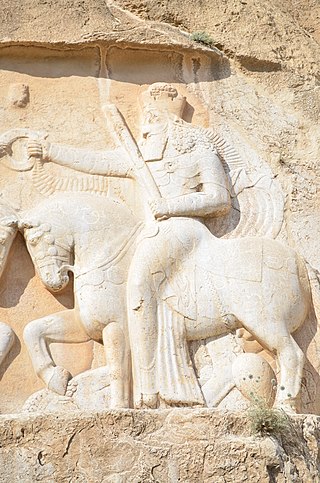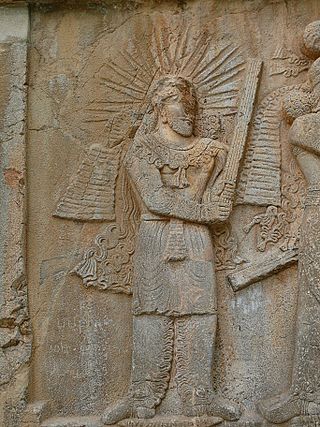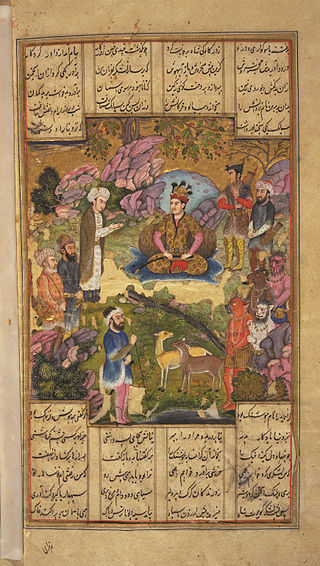| Number | Name (Romanized) | Name (Modern Persian) | Translations |
|---|
| 1 | Yazad
Yazad | ايزد | Worthy of Worship
Praiseworthy |
| 2 | Harvesp-tawan
Harvesp-Tavaan | هروسپ توان | All-Powerful
Almighty |
| 3 | Harvesp-agah
Harvesp-Aagaah | هروسپ آگاه | All-Knowing
All-Knowing |
| 4 | Harvesp-khoda
Harvesp-Khudaa | هروسپ خدا | Lord of all
Lord of All |
| 5 | Abadeh
Abadah | ابده | Without Beginning
Without Beginning |
| 6 | Abi-anjam
Abee-Anjaam | ابی انجام | Without End
Without End |
| 7 | Bun-e-stiha
Bune-Steeh | بنستيه | Root of Creation
Root of Creation |
| 8 | Frakhtan-taih
Fraakhtan-Teh | فراختن ته | Endless Bliss
The End of All |
| 9 | Jamaga
Jamaga | جمغ | Primal Cause
Ancient Cause |
| 10 | Prajatarah
Parajtarah | پراژتره | Exalted One
More Noble |
| 11 | Tum-afik
Tum-Afeek | توم اویک | Purest of the Pure
Most Open (Innocent) |
| 12 | Abaravand
Abarvand | ابروند | Detached from All
Separate from All |
| 13 | Paravandeh
Parvandaah | پروندا | In touch with all
Connected with All |
| 14 | An-ayafeh
An-Aiyaafah | ان اياف | Unattainable
Unreachable by anyone |
| 15 | Hama-Ayafeh
Ham-Aiyaafah | هم اياف | Attainer of All
Who Can Reach All |
| 16 | Adro
Aadaro | آدرو | Most Righteous
Most straightforward; Truest of All |
| 17 | Gira
Geeraa | گيرا | Upholder of all
Who Holds Everyone |
| 18 | A-ehem
A-Chem | اچم | Beyond reason
Without Cause (Does not need a reason for existence) |
| 19 | Chamana
Chamanaa | چمنا | Sovereign Reason
Reason for Being |
| 20 | Safana
Safanaa | سفنا | Bountiful One
Creator of Progress |
| 21 | Afza
Afjaa | افجا | Ever Prolific
Creator of Growth |
| 22 | Nasha
Naashaa | ناشا | Reaching equally to all
Who Reaches Everyone Equally |
| 23 | Parwara
Parvaraa | پرورا | Nourisher
Provider |
| 24 | Ianaha
Eeyaanah | ايانا | Protector of the world
Protector of Creation |
| 25 | Ain-aenah
Aaeen-Aaenah | آيين آيينه | Never Changing
Not Different |
| 26 | An-aenah
An-Aaeenah | ان آيينه | Formless
Without Shape |
| 27 | Kharoshid-tum
Khrosheed-Tum | خراشيدتوم | Most Steadfast among the Steadfast
Most Determined |
| 28 | Mino-tum
Meeno-Tum | مينوتوم | Lord Invisible
Most Invisible |
| 29 | Vasna
Vaasnaa | واسنا | All-Pervading
Omnipresent |
| 30 | Harvastum
Harvastum | هروس توم | All in all
Most Complete |
| 31 | Hu-sepas
Hu-Sepaas | هوسپاس | Worthy of our profound thanks
Worthy of Thanksgiving |
| 32 | Har-Hamid
Har-Hameed | هرهميد | All embracing Goodness
Completely Good Natured |
| 33 | Har-naik faraih
Har-Nek-Fareh | هرنيک فره | All embracing Holy light
Completely Good Noble Aura |
| 34 | Baish-tarana
Besh-Tarnaa | بيش ترنا | Remover of affliction
Remover of Suffering |
| 35 | Taronish
Taroneesh | تروبيش | Beyond Affliction
Mysterious |
| 36 | Anah-aoshaka
An-Aoshak | انوشک | Immortal
Immortal |
| 37 | Farasaka
Farsak | فرسک | Fulfiller of Holy Desires
Grantor of Wishes |
| 38 | Pajohdehad
Pajoh-Dahad | پژودهد | Creator of Holy attributes
Creator of Noble Nature |
| 39 | Khwafar
Khvaafar | خوافر | Compassionate Judge
Generous with Justice |
| 40 | Avakhshiaea
Afakhsheeaaeaa | اوه خشيا | Merciful Giver
Grantor of Generosity |
| 41 | Abaraja
Abarjaa | ابرجا | Bountiful Giver
Most Abundant Provider |
| 42 | A-satoha
A-Satoh | استوه | Unconquerable
Who Does Not Get Angry |
| 43 | Rakhoha
Rakhoh | رخوا | Freest of the free
Independent; Without Worry |
| 44 | Varun
Varoon | ورون | Deliverer from evil
Protector from Evil |
| 45 | A-farefah
A-Farefah | افريفه | Never Deceiving
Who Does Not Deceive |
| 46 | Be-fareftah
Be-Farefah | بی فريفه | Never Deceived
Who Cannot Be Deceived |
| 47 | A-dui
A-Duee | ادويی | One without a second
Without Duality |
| 48 | Kam-rad
Kaame-Rad | کامرد | Lord of desire
Lord of Wishes |
| 49 | Farman-kam
Farmaan-Kaam | فرمان کام | Decreer of Sovereign Desire
Wish Is His Command |
| 50 | Aekh Tan
Aokh-Tan | ائيک تن | Soul Supreme
Without Body |
| 51 | A-faremosh
A-Faremosh | افراموش | Never-forgetting
Who Does Not Forget |
| 52 | Hamarna
Hamaarnaa | همارنا | Just Accountant
Keeper of Accounts |
| 53 | Sanaea
Sanaaeaa | سنايا | Knowing all things
Worthy of Knowing; All Knowing |
| 54 | A-tars
A-Tars | اترس | Fearless
Fearless |
| 55 | A-bish
A-Beesh | ابيش | Devoid of pain
Without Suffering |
| 56 | A-frajdum
Afraajdum | افراجدم | Most exalted one
Most High |
| 57 | Ham-chun
Ham-Chun | هم چون | Ever the same
Always the Same |
| 58 | Mino-satihgar
Meeno-Steeh-Gar | مينو ستی گر | Invisible Creator of the Universe
Creator of the Universe Invisibly |
| 59 | A-minogar
A-Meenogar | امينوگر | Creator of the Profoundly Spiritual
Creator of Much Invisible Creations |
| 60 | Mino-nahab
Meeno-Nahab | مينو نهب | Hidden within the spirit
Hidden in Invisible Creation |
| 61 | Adar-bad-gar
Aadar-Baad-Gar | آذربادگر | Transmuter of Fire into Air
Who Changes Fire Into Air |
| 62 | Adar-nam-gar
Aadar-Nam-Gar | آذرنم گر | Transmuter of Fire into dew
Who Changes Fire Into Water |
| 63 | Bad-adar-gar
Baad-Aadar-Gar | بادآذرگر | Transmuter of Air into Fire
Who Changes Air Into Fire |
| 64 | Bad-nam-gar
Baad-Nam-Gar | بادنم گر | Transmuter of Air into dew
Who Changes Air Into Water |
| 65 | Bad-gail-gar
Baad-Gel-Gar | بادگل گر | Transmuter of Air into Earth
Who Changes Air Into Dust |
| 66 | Bad-gred-tum
Baad-Gerd-Tum | بادگردتوم | Supreme Transmuter of Air into dust
Who Changes Air Into Wind |
| 67 | Adar-kibritatum
Aadar-Keebreet-Tum | آذرکبريت توم | Supreme Transmuter of Fire into divine sparks
Who Changes Fire Into Jewels |
| 68 | Bad-gar-jae
Baad-Garjaae | بادگرجای | Spreading Air everywhere
Who Creates Air In All Places |
| 69 | Ab-tum
Aab-Tum | آب توم | Creator of Lifegiving water
Creator of Much Water |
| 70 | Gail-adar-gar
Gel-Aadar-Gar | گل آذرگر | Transmuter of Dust into Fire
Who Changes Dust Into Fire |
| 71 | Gail-vad-gar
Gel-Vaad-Gar | گل وادگر | Transmuter of Dust into Air
Who Changes Dust Into Air |
| 72 | Gail-nam-gar
Gel-Nam-Gar | گل نم گر | Transmuter of Dust into water
Who Changes Dust Into Water |
| 73 | Gar-gar
Gar-Gar | گرگر | Master Craftsman
Creator of Creators |
| 74 | Garo-gar
Gar-O-Gar | گروگر | Rewarder of sincere desires
(Fulfiller of Wishes) * |
| 75 | Gar-a-gar
Gar-Aa-Gar | گرآگر | Creator of all Humanity and its actions
(Creator of Mankind) * |
| 76 | Gar-a-gar-gar
Gar-Aa-Gar-Gar | گرآگرگر | Creator of all Human and Animal Life
(Creator of All Things) * |
| 77 | A-gar-agar
A-Gar-Aa-Gar | آگرآگر | Creator of all the four elements
(Creator of 4 Elements) * |
| 78 | A-gar-a-gar-gar
A-Gar-Aa-Gar-Gar | آگرآگرگر | Creator of all the planets and all other worlds
(Creator of Stars) * |
| 79 | A-guman
A-Gumaan | اگمان | Never in doubt
Without Doubt |
| 80 | A-jaman
A-Jamaan | اجمان | Ageless
Timeless |
| 81 | A-Khuan
A-Khuaan | اخوان | Eternally awake
Sleepless |
| 82 | Amast
Aamasht | اميشت | Ever-alert
Alert |
| 83 | Fashutana
Fashutanaa | فشتوتنا | Ever-Protecting
Always Guarding & Progress Creator |
| 84 | Padmani
Padmaanee | پدمانی | Recorder of Man's actions
Keeper of Limits |
| 85 | Firozgar
Feerozgar | فيروزگر | Victorious
Victorious |
| 86 | Khudawand
Khudaavand | خداوند | Lord of the Universe
Lord of Creation |
| 87 | Ahuramazd
Ahur-Mazd | اهورا مزدا | Lord of Life and Wisdom
Wise Lord |
| 88 | Abarin-kuhan-tawan
Abreen-Kohun-Tavaan | ابرين كهان توان | Preserver of Creation
Most Capable of Preserving Originality of Creations |
| 89 | Abarin-nao-tawan
Abreen-No-Tavaan | ابرين نوتوان | Renewer of Creation
Most Capable of Creating New Creations |
| 90 | Vaspan
Vaspaan | وسپان | Embracing All Creation
Who Can Reach All Creations |
| 91 | Vaaspar
Vaspaar | وسپار | Giver of All Things
Who Can Provide Everything |
| 92 | Khawar
Khaavar | خاور | Infinitely Patient
Generous |
| 93 | Ahu
Ahu | اهو | Lord of exisience
Lord of Existence |
| 94 | Avakshidar
Avakhseedaar | اوخسيدار | Forgiver of sins
Forgiver |
| 95 | Dadar
Daadaar | دادار | Divine Creator
Creator of Justice |
| 96 | Raiyomand
Rayomand | رايومند | Rayed in glory
Full of Brightness |
| 97 | Khorehmand
Khorehomand | خرهمند | Haloed in Light
Full of Aura, Light |
| 98 | Davar
Daavar | داور | Lord of Justice
Giver of True Justice |
| 99 | Kerfaigar
Kerfegar | کرفگر | Lord of Just Rewards
Lord of Good Works |
| 100 | Bokhtar
Bokhtaar | بوختار | Liberator
Giver of Freedom for Progress |
| 101 | Farsho-gar
Frash-Gar | فرشوگر | Awakener of Eternal Spring
Refresher of the Soul with Progress |










